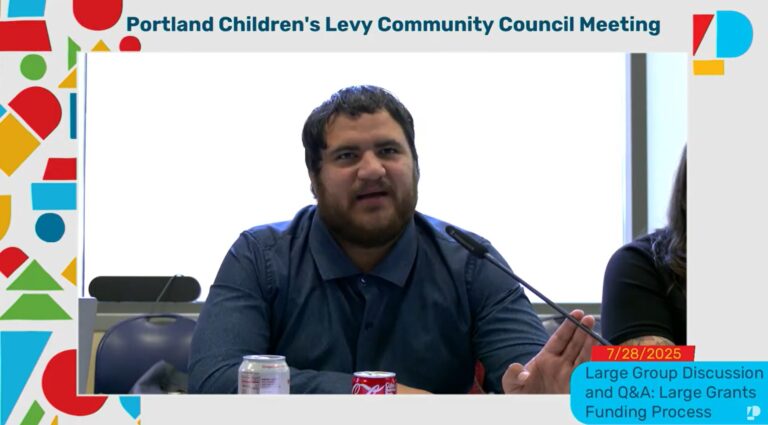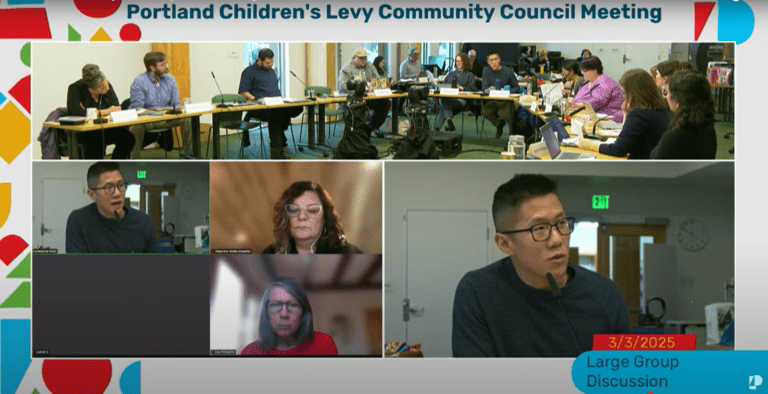Community Council meeting recap (10-25-24)
Welcome to the recap of the Oct. 25, 2024 Community Council meeting. Eleven out of 13 members attended the meeting.
Meeting outcomes
- Understand their role in the upcoming large grants funding process and associated advocacy limitations.
- Strengthen their ability to understand and make meaning of data visualizations summarizing applicant characteristics.
- Prep for discussing and recommending applicant characteristics that staff will use to shape two anonymous portfolios.
- Discuss and vote on suggested bylaw amendments.
Meeting summary
The purpose of the Oct. 25 meeting was to prepare the Community Council to engage in the Portland Children’s Levy (PCL) large grants funding process. As a result, much of the meeting was spent orienting and familiarizing council members to the process, content, and data they could expect in January and February 2025 meetings.
Community Council’s role in large grants funding process
Staff shared that the Community Council will play an advisory role in the large grants funding process. In late January 2025, staff will ask the Community Council to advise on which application characteristics staff should use to craft two anonymous portfolios of applications for funding. Staff will share de-identified PCL-wide or program area application characteristics; the Community Council will not receive or discuss applicant names or identifying information. Staff will anonymize the data and keep the discussion at the policy level. Doing so allows council members to focus on big-picture considerations, such as the allocation of resources across all of PCL’s program areas and reduction of conflicts of interest and biases between council members and applicants.
From January’s meeting, staff will take the Community Council’s priorities and craft two anonymous PCL-wide portfolios. The council will reconvene at the end of February to recommend one of the two portfolios for funding.
At the beginning of March, staff will send the recommended portfolio to applicants and the Allocation Committee. Applicants will have the opportunity to submit written or video testimony in response to recommendations between mid-March and early April. The Allocation Committee will convene at the end of April to make funding decisions, which will go to the Portland City Council for final approval. Once approved, grants will start July 1, 2025.
Advocacy limitations
Staff explained that applicants are not allowed to advocate for funding for their programs to council members during the funding process. In addition, council members will need to disclose conflicts of interest at the upcoming January and February meetings. Council members role-played several scenarios, practiced informing potential applicants of this advocacy rule, and practiced stopping advocacy conversations
Application characteristics & data visualizations
View the slides and speaker notes of the data visualization presentation in PDF format. In the above YouTube recording of the meeting, the audio and visual was mistakenly cut off from 50:47 to 56:00 during a portion of the data visualization presentation.
Staff and council members spent the majority of the meeting making meaning of data visualizations about application characteristics. Staff presented 4 sets of data visualizations summarizing 2019-20 large grants application characteristics and plan to use similar visualizations to summarize 2024-25 application information for the Community Council’s discussion at the January and February meetings. Council members worked in pairs to understand the data visualizations, staff facilitated a full group discussion about the data, and then the group went through that exercise three more times with three additional data sets. At the end of all four rounds, council members had the opportunity to reflect on learnings, needed support, and outstanding questions. The goal of this exercise was to prepare council members to prioritize application characteristics at their January meeting.
Bylaw amendments
Staff proposed an amendment to the attendance requirements outlined in the Community Council bylaws, with the goal of aligning our policies with disability inclusion values and increasing clarity around attendance requirements. Currently, council members are removed from this body if they miss 3 council meetings in one calendar year. Staff proposed amendments to exclude absences due to illnesses or emergencies. The Community Council voted 9-1 to adopt the proposed amendments.


